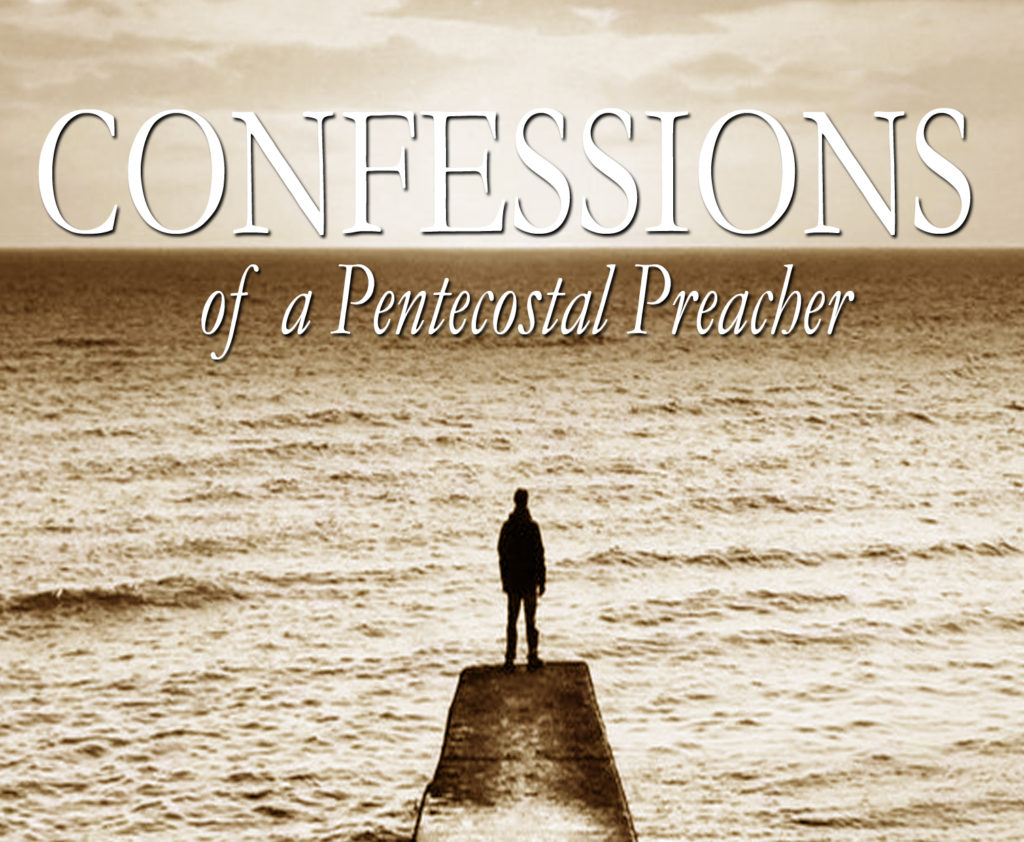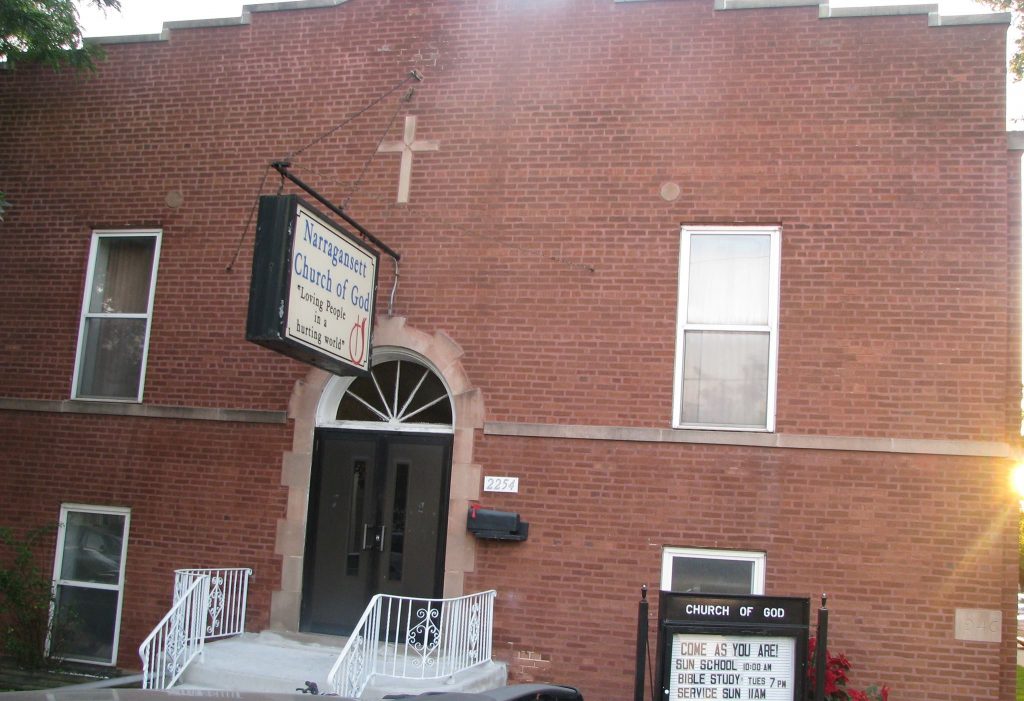I was baptized…
As we are approaching 30 years in ministry in 2020, the centennial of Bulgarian Pentecostalism, a quarter of a century since we started the Bulgarian church in Chicago and several other important anniversaries, I have felt compelled to finally complete several books that have been long in the making. As I was digging threw some old documents just recently, I came to my first recorded account of being baptized with the Holy Spirit. Being a fifth generation Pentecostal, this experience is important too me and I have written and spoken about it in many occasions. However, this first account I have recoded many over 20 plus years ago is a personal recollection I would like to share today:
That night my cousin started to talk to me after church asking me if I was saved. I obviously was not, so she told me that God could change my life in one prayer. I refused to pray, but she kept on talking and I realized if I did not pray the prayer then, I never would. When I repeated the prayer after her, she asked me if I felt anything. My answer was, “No.” She assured me I would feel something soon. After this, everyone went home. As soon as I got home I took my pack of cigarettes and I threw them out the window. Indeed that night, something happened. For the first time in my life I felt free. It was August 11, 1990.
The next day was Sunday, and I took my first communion in church. On Monday I started fasting for the baptism of the Holy Spirit. I talked with my cousin that night telling her about my decision to fast three days for the baptism. She said that I did not need to fast because the Holy Spirit was already given to the believers and the only thing I needed to do was to receive Him.
On Thursday night (August 16, 1990) we had a healing meeting during the first Pentecostal conference after the fall of Communism. After the sermon, the preacher said we were going to do three things: first – we would all prayer together, second – he would pray for us and third – he would tell us to do what we have not been able to do and we would do it. And so we did. We all prayed. Then he prayed. I remember praying for the baptism. When he said, “Do what you were not able to do before” the Holy Spirit filled me, and I started to speaking in tongues and have not stopped since then.
A month later I returned to school. Everything was different then. I witnessed to all my school-mates the first night I was there, telling them about the change in my life. Only one decided to go to church with me. He got saved that following Friday. It was on the night when I preached my first sermon.
I had been involved in the church for a few months, when my pastor asked me to start working with the youth group. I started with twelve people, many dreams, and no experience. The results were likewise. Our youth meetings on Tuesday night were filled with prayer and praise, rather than long sermons. We would often get together for prayer, and pray all night long. Our expectations were great. I remember praying that everyone I looked at would get saved.
A few months later, in the spring of 1991, when the Lord blessed us abundantly, people from our school started coming to the little building at the end of the town, a former communist club, where we had our meetings. Many were saved during our meetings. A number of skinheads, drug addicts, people that everyone knew in school, came to our meetings, were delivered and joined the youth group. Everyone in the group received the baptism with the Holy Spirit. I distantly remember one night when 26 people were filled during and spoke in tongues the prayer. The youth group grew quickly with the hundreds in attendance. For all of us that had prayed for revival, this was a time of refreshing and encouragement…
1992 in the city of Pravetz, we experienced one of the greatest student revivals
1993 I graduated from the school there
1994 I came to the States to start college
1995 The Bulgarian church in Chicago started
1996 Bibliata.com was started
Now 30 years later, the time to tell the story has finally come…
This book should have been published seven years ago in 2013. Its original subtitle was going to read “7 Years in Bulgaria.” Instead, it took seven years to finish it with all documents, research archives and new cases. Now, it is finally here and it finally reads like a story – not just choppy interviews, deposition documented testimonies or court records, but a story of struggle, strength and solitude. A story of life and a story of us.
1995-96 The establishing of the first Bulgarian Church of God in Chicago and its first split
2000-01 The contracted building of the ministry center for the Central Church of God in Sofia
2002-03 The church split in Southaven and what followed next
2005-06 The post-communist split of the Bulgarian Church of God and consecutive sub-denominations
2010-13 The social media network that cost us millions (of souls)
2016 The vote that forced to kill a church
2019-20 The sale of the ministry center for the Central Church of God in Bulgaria
READ: CONFESSIONS of a Pentecostal Preacher
I was saved…
During the month of September, our ministry is celebrating 30 years in the ministry. I was saved in my hometown of Yambol Bulgaria on August 9, 1990 and baptized with the Holy Spirit seven days later. In two weeks time God called me to preach and I preached my first sermon one September Friday at the Church of God in the small mountain town of Pravetz, Bulgaria. Fourteen were present at the meeting. The Bulgarian Church of God was still underground. Little I knew that only a few months later, the youth group of the church would count over 100 strong and growing, the Berlin Wall would have had fallen and revival would’ve been on the way. That night in Pravetz Bulgaria I just preached a sermon from the Word. That same Word, which God still claims cannot return void. For Revival must go on …
Our story has a humble beginning working with small Pentecostal-holiness groups in the Bulgarian mountains and growing the Pravetz Church of God youth group to over 300 members in a city of 5,000. And thus our ministry moved forward: from the storefront churches of Bulgaria to establishing the Bulgarian congregation of Chicago; from the backwoods Bulgarian villages to postgraduate level research; from the old red back hymnal to the latest technological invention; from hitchhiking to the charter flights and using any transportation necessary to get to the Sunday morning service and minister. We have done whatever needed to be done for the ministry to go on in Bulgaria and abroad. But we never forgot where we came from and we have faithfully kept on returning to minister to our humble beginnings…
At age 30 a ministry is not an old veteran, but just starting in its prime. We are both convinced and committed toward a new level of ministry in 2020 in a new spiritual realm. With this vision in mind, we have present the Bulgarian Church of God a dynamic strategy for the next five years of its development and ministry. We invite you to partner with us in payer and fasting for this endeavor.
This book should have been published seven years ago in 2013. Its original subtitle was going to read “7 Years in Bulgaria.” Instead, it took seven years to finish it with all documents, research archives and new cases. Now, it is finally here and it finally reads like a story – not just choppy interviews, deposition documented testimonies or court records, but a story of struggle, strength and solitude. A story of life and a story of us.
1995-96 The establishing of the first Bulgarian Church of God in Chicago and its first split
2000-01 The contracted building of the ministry center for the Central Church of God in Sofia
2002-03 The church split in Southaven and what followed next
2005-06 The post-communist split of the Bulgarian Church of God and consecutive sub-denominations
2010-13 The social media network that cost us millions (of souls)
2016 The vote that forced to kill a church
2019-20 The sale of the ministry center for the Central Church of God in Bulgaria
READ: CONFESSIONS of a Pentecostal Preacher
U.S. sends thousands of troops to Bulgaria amid month-long protests and political unrest
Washington may send troops to Bulgaria and Romania as part of the redistribution of US forces in Europe. This was reported by the Wall Street Journal, citing sources familiar with the Pentagon’s plans. According to the information, the redistribution of Stryker brigades in Bulgaria and Romania is possible as a result of President Trump’s decision to withdraw 12,000 troops from Germany, half of which will be sent elsewhere in Europe, including the Black Sea region. The process would take years and cost at least $6 billion. The Stryker Brigades are combat teams of thousands of soldiers and hundreds of vehicles, ready to be transferred by transport aircraft and deployed within 96 hours. NATO air-force bases in Novo Selo and Bezmer are withing minutes of our long term ministry location in the area. Newly built migrant camps are also located nearby along the highway leading to the boarder with Turkey, less than an hour of (normal speed) drive.
CONFESSIONS of a Pentecostal Preacher (9.1.20.)
This book should have been published seven years ago in 2013. Its original subtitle was going to read “7 Years in Bulgaria.” Instead, it took seven years to finish it with all documents, research archives and new cases. Now, it is finally here and it finally reads like a story – not just choppy interviews, deposition documented testimonies or court records, but a story of struggle, strength and solitude. A story of life and a story of us.
1995-96 The establishing of the first Bulgarian Church of God in Chicago and its first split
2000-01 The contracted building of the ministry center for the Central Church of God in Sofia
2002-03 The church split in Southaven and what followed next
2005-06 The post-communist split of the Bulgarian Church of God and consecutive sub-denominations
2010-13 The social media network that cost us millions (of souls)
2016 The vote that forced to kill a church
2019-20 The sale of the ministry center for the Central Church of God in Bulgaria
READ: CONFESSIONS of a Pentecostal Preacher
A quarter of a century ago in Chicago
I left Chicago on this day 25 years ago (July 30, 1995). The Bulgarian church that day held service at 1 PM with 64 Bulgarians and many other internationals in attendance. Bulgarian students from the neighboring Indiana and Wisconsin attended as well. There was even a Bulgarian family from Alaska.
It was a Sunday. I left Chicago to preach in Beloit, WI that night and then left for Washington, D.C. the following morning. While driving north with quite the speed my Carolina blue Grand National began filling with white smoke. At first, I thought the air conditioner was on its last leg in the hot Chicago summer of 1995, but the air remained strong and cold. The cloud proceeded and it was so sensible that I had to slow down and basically stop on the side of the road. In my 30 years of ministry, I have only seen this one more time – in 2011 when the Glory of God descended over a youth camp we were preaching in the Bulgarian mountains. I did finally preach in Beloit and made it to D.C. the next day, but the vision of the cloud remained with me for the next 25 years.
Meanwhile, the word of mouth had spread and the Bulgarian church in Chicago was growing among the Bulgarian diaspora. On October 7, 1995, I was able to visit the church in Chicago again and present it to the National Overseer of the Bulgarian Church of God, Pastor Pavel Ignatov who visited the Bulgarian congregation in Chicago for the first time. By that time, it has become evident that the initial structuring for growth was giving more than expected results. The church became not only the first officially registered Bulgarian Pentecostal congregation in the United States, but also an important social and educational center able to minister to the 100,000 Bulgarians that live in the Great Lake region today.
Called to another mission, I left Chicago on July 30, 1995. The church bulletin upon my departure under Farewell and Appreciation read: “Today we are saying thank you to Dony for a job well done this past summer. He has served our church faithfully, and has been a tremendous blessing to Narragansett Ministries. Immediately following worship this morning, there is a dinner in Dony’s honor in the fellowship hall. And everyone is invited to attend.” Quiescently, while writing this next book for the quarter century anniversary of the Bulgarian Church in Chicago, I was able to find this last bulletin in a box with several dozen letters I had sent weekly to my parents in Bulgaria. Surprising even to myself, those letters contain pictures, documents, dates, growth charts and progression predictions that are surprising even to me today. I remember spending countless nights in prayer, contemplating and strategizing over the new Bulgarian church plant, but I had forgotten all this was carefully documented as a case study.
The church congregation presented me with a plaque that represented my efforts and work in Chicago, which I have also kept until now. Because this plaque represents the prayers and the vision of many who are continuing the work today, establishing and leading Bulgarian churches around the world to providing pastoral care for many who have left the homeland in search for a better life. To these ministers goes my personal token of appreciation and thanks, “Well done thou good and faithful!” For me personally today a quarter of a century later, this plaque represents one very simply thing – I never betrayed my dreams. And in my book, this is well done…
Preparing to celebrate 30 YEARS in the MINISTRY
Bulgaria in protest: Europe fear ‘another Poland or Hungary’
Bulgaria protests continue despite sacking of three government ministers
Overt week of anti-government protests in Bulgaria have sparked fears in Brussels that the country could become “another Hungary or Poland”. Demonstrators have complained of corruption and joined the country’s president in calling for PM Boyko Borissov to resign. The accusations have prompted concern among some MEPs that Bulgaria will be the next to clash with Brussels over the EU’s fundamental values. Brussels has launched legal action over issues such as judicial reforms in Poland and Hungary’s treatment of asylum seekers.
“What Europe has to fear, what the European Parliament has to fear is that another Poland or Hungary is coming,” said Bulgarian MEP Radan Kanev. He says that he has raised concerns in the European Parliament over what he says is a “deep rule of law crisis”, about “media market capture”, the “really brutal party political behaviour of the chief prosecutor’s office” which contributes to the overall atmosphere of “political and legal insecurity” in the country.
But another Bulgarian MEP, Andrey Kovatchev, from Borissov’s party, has rejected allegations there is any democratic drift in the country. “We have absolutely no comparison here with Poland or Hungary,” he said. “We have full freedom. We cannot have one case where academic freedom, for example, is limited like unfortunately in Budapest with the university. We have total freedom of everybody to express their opinion against Mr Borissov, against the government.”
For another Bulgarian MEP, Elena Yoncheva, from the Socialists and Democrats, the whole system is corrupt. “It is because of corruption that Bulgaria is the poorest country in the European Union,” she said. Yoncheva said Bulgaria loses €11 billion each year because of corruption, according to a European Parliament report. “We are talking about a country of seven million inhabitants,” she added. “Take action, not just talk. Talking, seeing, it’s good, but we must take action.”
Security Alert: BULGARIA
 The U.S. Embassy is Sofia, Bulgaria has issued a continuous security alert to all American citizens in the capital city. See the complete warning at the Embassy’s website here: https://bg.usembassy.gov/security-alert-u-s-embassy-sofia-bulgaria-july-11-2020/
The U.S. Embassy is Sofia, Bulgaria has issued a continuous security alert to all American citizens in the capital city. See the complete warning at the Embassy’s website here: https://bg.usembassy.gov/security-alert-u-s-embassy-sofia-bulgaria-july-11-2020/
Political unrest, protest and corona virus ministry opportunities in BULGARIA
This is the precise political and social construct in Bulgaria we had in mind in our July 1, 2020 publications on Difficulties in Doing Mission Work in Bulgaria in 2020. Now that our broad ministerial projection is taking shape almost prophetically, these difficulties are becoming more and more clear. The current developments adding to them are:
1. Social unrest placing our church communities in the midst of political protests and COVID-related changes in the legal process.
2. The Social Service Bill active as of July 1, 2020 though three paragraphs from the bill were dropped at the final vote dealing with: (a) personal information about children given to third parties and NGO vendors, (b) control on the proper channels of notifications via regard of social services, (c) social workers open access to children at risk to obtain needed information for the social service process.
3. Application of the New Bill of Religion in Bulgaria in regard of: (a) national open registry of credentialed ministries, (b) access of only certain ministers to a church building, (c) special instructions for church services regarding COVID-19 and related restrictions. For example, the largest Pentecostal organization in Bulgaria sent letters to all its congregations to refrain from releasing pandemic information that has not been channeled from “the media proper sources,” as related to state media and the whole “fake news” narrative.
JULY 11, 2020: Thousands call on Bulgarian government to resign in anti-graft protests
SOFIA (Reuters) – Thousands of Bulgarians, frustrated with endemic corruption, protested on Saturday for a third day in a row, demanding the resignation of the center-right government of Prime Minister Boyko Borissov and the country’s chief prosecutor. Protesters, who chanted “Mafia” and “Resign” on Saturday, accuse Borissov’s third government and chief prosecutor Ivan Geshev of deliberately delaying investigations into links between graft-prone officials and local oligarchs. Protests against what many called “state capture” and “mafia-style” rule were held in se veralother cities in the Balkan country. Police arrested 18 people late Friday after scuffles during the anti-corruption protests, but the demonstration Saturday was largely peaceful. Bulgaria, the European Union’s poorest and most corrupt member state, has long pledged to root out graft but has yet to jail any senior officials on corruption charges. Public anger escalated following prosecutor raids on the offices of two of the Bulgarian president’s staff as part of investigations, which many saw as a targeted attack on President Rumen Radev, a vocal critic of the government. In an address to the nation Saturday, Radev said the protests showed that Bulgarians had had enough and called for the resignation of the government and the chief prosecutor.
Borissov, whose third government took office in 2017, prided himself on building new highways, boosting people’s incomes and getting the country into the euro zone’s “waiting room,” and said he does not plan to step down amid a looming coronavirus crisis. “We have done so much already, we have made so much efforts, nothing is keeping us in office except for responsibility,” Borissov said in a posting on his Facebook page. His GERB party said Radev, who was nominated for the post by opposition Socialists, was stoking a political crisis. GERB remains Bulgaria’s most popular political party, according to opinion polls. The next general elections are due in spring 2021.
At another demonstration Saturday on the Black Sea coast near Burgas, hundreds of Bulgarians demanded access to a public coastline near the summer residence of Ahmed Dogan, a businessman and senior member of the ethnic Turkish MRF party. The demonstration was organised after the head of a small liberal party was denied access to the coast by armed guards of the National Protection Service, who were protecting Dogan. Protesters say the move was a sign of toxic links between the ruling elite and shady interests in the Balkan country.
JULY 13, 2020 Bulgarian anti-graft protests want Borissov’s government out
SOFIA (Reuters) – Thousands of people turned out in the Bulgarian capital Sofia on Monday for the fifth day running to demand the resignation of Prime Minister Boyko Borissov, voicing growing frustration with high-level corruption and the business tycoons they believe are benefiting. Demonstrators take part in an anti-government protest in Sofia, Bulgaria, July 13, 2020. The banner reads: “Freedom.” Similar protests in at least 10 other cities criticised prosecutors’ failure to address genuine high-level graft, which they said was undermining the rule of law in the European Union’s poorest country. Many yelled “Mafia!” and “Resign!”.
The Balkan nation, ranked as the most corrupt EU member state by the graft watchdog Transparency International, has yet to convict a single senior official of corruption. “I am here to protest against the corruption that has engulfed this country, against the oligarchs who have slipped into each and every sphere of the public administration,” said 42-year-old protester Lachezar Lazarov. Borissov has been in office almost without a break since 2009. He has pledged to uproot high-level corruption, but critics say public institutions have weakened and the power of tycoons has grown on his watch. A parliamentary election is scheduled for next spring. Public anger broke out last week after prosecutors raided the offices of President Rumen Radev, a vehement critic of Borissov, as part of probes into two of Radev’s aides. Many saw the move as an attack on the president, who has often criticised Borissov’s centre-right government on the same grounds as the protesters and called for his resignation. The protests have shown no sign of dwindling in size and more are planned for later in the week. The opposition Socialists, who backed Radev for president, have said they will put forward a motion of no confidence in the government on Wednesday. On Monday, some of the protesters also demanded the resignation of the interior minister over police violence at Friday’s protests, when 18 people were arrested, including two young men who were taken to hospital after being beaten. The police said they were investigating.
JULY 14, 2020 Bulgaria’s opposition says state prosecutors won’t deflect anti-government protests
SOFIA (Reuters) – State prosecutors said on Tuesday a fugitive Bulgarian tycoon facing criminal charges had helped orchestrate protests against the prime minister, as demonstrations demanding the government quit because of corruption entered a sixth day. The main opposition Socialist party said state prosecutors were trying “to discredit the protests as paid and organized” but said officials would not silence demonstrators seeking to drive Prime Minister Boyko Borissov from office. “It is easy to see that there are people who sincerely want change,” the Socialist party leader Kornelia Ninova said in a statement, as thousands of anti-government protesters gathered in Sofia and other cities chanting “Resign” and “Mafia”.
The Balkan nation, the poorest member of the European Union and ranked the bloc’s most corrupt state by graft watchdog Transparency International, has yet to convict a single senior official of corruption. Alongside demanding the prime minister quit, protesters have called for the resignation of the chief prosecutor, saying he has not done enough to root out high-level corruption.
The U.S. embassy in Sofia weighed in on Monday, with a statement saying: “Every nation deserves a judicial system that is non-partisan and accountable to the rule of law.”
State prosecutors dismiss accusations of bias. Borissov, who has been in power almost without break since 2009 and who has repeatedly promised to sweep out corruption, has said his government will not resign and elections would be held in spring. Senior ministers repeated that on Tuesday. Prosecutors published on Tuesday what they said was a tapped telephone call in which gambling tycoon Vasil Bozhkov told an opposition politician he had helped boost the size of the protests. The publication prompted the politician to quit the Socialists parliamentary group. Bozkhov, who fled the country to escape charges ranging from tax evasion to extortion, which he denies, said in a message on his Facebook page that he had supported the protests from the start and would continue to do so.
UPDATED JULY 16, 2020: Bulgaria PM plans govt overhaul in face of protests
SOFIA (Reuters) – Bulgarian Prime Minister Boyko Borissov, facing a no-confidence vote in parliament and anti-corruption protests in the streets, said on Thursday that his government must stay in place to fight the coronavirus – though he may overhaul his cabinet soon. The three-times prime minister said he would consider an “enormous overhaul” of his center-right cabinet after the no-confidence vote next week, which the ruling party can survive with the support of a small populist party and independent lawmakers. He reiterated that the anti-graft protests and calls for early polls by the opposition Socialists and President Rumen Radev were undermining the Balkan country’s chances of weathering a looming coronavirus crisis that will hit incomes and jobs hard. “We are facing very hard months ahead… Who from those on the square has more experience than us, knows more or can do more?” the defiant 61-year-old said after a meeting with his junior coalition partners. “We should show at the vote that the ruling coalition has its majority in parliament. And then if they want, all opposition parties need to say how they see dealing with the epidemic and financial crisis that is coming,” he said.
Borissov said on Thursday that he had asked his finance, interior and economy ministers to step down to put an end of speculation that they were under the influence of a controversial media magnate and businessman from another political party, but that he will not accept their resignations for now. Thousands of Bulgarians have been holding protests demanding the resignation of the government and the chief prosecutor Ivan Geshev over their failure to ensure the rule of law and sever links between graft-prone officials and powerful tycoons in the country. Geshev has denied any bias in his probes and has declined to step down. More anti-corruption protests are planned in Sofia and other major cities for the eight day in a row later on Thursday. Consecutive governments in the European Union’s poorest member state have pledged to put an end to a climate of impunity and impose the rule of law strictly. But the authorities have yet to jail a single senior official on corruption charges.
High Bible Engagement in 2020
High Bible Engagement
Another comforting statistic is that half of Americans consider themselves Bible users. According to Barna, this includes people who engage with the Bible on their own at least 3-4 times a year. On the other hand, only 32% never engage with a Bible. Overall, this shows that more people are interested in exploring their faith than not.
Desire For More Bible Study
It shouldn’t come as a surprise that while people do want to spend more time studying the Bible, most have a hard time finding any extra time. Of course, some don’t study more simply because they need someone to help guide them. Barna found that 58% of Americans wish they could study more often and that includes 22% of skeptics.
Most People Own A Bible in 2020
One of the most surprising church statistics is just how many people own a Bible. Barna found that a shocking 87% of homes have at least one Bible. Even 67% of those who consider themselves skeptic, own a Bible. It shouldn’t come as a surprise that seniors (93%) and Baby Boomers (90%) are more likely to own a Bible than millennials (82%).













